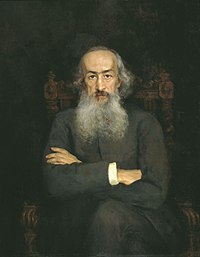You can help expand this article with text translated from the corresponding article in Russian. (March 2020) Click for important translation instructions.
|
| Konstantin Bestuzhev-Ryumin | |
|---|---|
 | |
| Born | (1829-05-14)May 14, 1829 |
| Died | January 14, 1897(1897-01-14) (aged 67) |
| Education | Academician |
| Alma mater | Imperial Moscow University (1851) |
| Scientific career | |
| Fields | History |
| Institutions | Saint Petersburg Imperial University |
Konstantin Nikolayevich Bestuzhev-Ryumin (Russian: Константин Николаевич Бестужев-Рюмин; 1829 in Kudryoshki, Nizhny Novgorod Governorate – 1897) was one of the most popular Russian Imperial historians of the 19th century. He held a chair in Russian History at the University of St. Petersburg (1864–85) and was elected into the St. Petersburg Academy of Sciences in 1890. In 1878 he founded and gave his name to the Bestuzhev Courses, "the largest and most prominent women's higher education institution in Russia".
Bestuzhev was born into one of Russia's oldest families; Mikhail Bestuzhev-Ryumin was his uncle. He started out as a journalist, helping Andrey Krayevsky to edit the literary journal Otechestvennye Zapiski where he published numerous reviews of historical and ethnographic works. He was drawn to a moderate wing of the Slavophile movement and welcomed Nikolai Danilevsky's theories. His pupils include Alexander III of Russia, several Grand Dukes from the Romanov family, and historian Sergey Platonov.
Among Bestuzhev's works are a set of popular books on Russia's history, several monographs on medieval paleography, and the two volumes of Russian History. The latter work is considered his magnum opus. Bestuzhev was known for carefully detailing the views of other historians whilst withholding his own opinions.
Citations
- Quoted from: Rochelle Goldberg Ruthchild. Equality and Revolution: Women's Rights in the Russian Empire, 1905-1917. University of Pittsburgh Press, 2010. ISBN 978-0-8229-6066-9. Page 56.
Sources
- Киреева Р. А. Бестужев-Рюмин и историческая наука второй половины XIX века. М., 1990.
- Киреева Р. А. Бестужев-Рюмин К. Н. // Историки России: Биографии / Под ред. А.А. Чернобаева. М., 2001.
- Малинов А. В. К. Н. Бестужев-Рюмин: Очерк теоретико-исторических и философских взглядов. СПб., 2005.
- Imperial Moscow University: 1755-1917: encyclopedic dictionary. Moscow: Russian political encyclopedia (ROSSPEN). 2010. pp. 66–67. ISBN 978-5-8243-1429-8 – via A. Andreev, D. Tsygankov.
- 1829 births
- 1897 deaths
- People from Bogorodsky District, Nizhny Novgorod Oblast
- People from Gorbatovsky Uyezd
- 19th-century nobility from the Russian Empire
- Historians from the Russian Empire
- Male writers from the Russian Empire
- Academic staff of Saint Petersburg State University
- Full members of the Saint Petersburg Academy of Sciences
- Imperial Moscow University alumni
- Privy Councillor (Russian Empire)